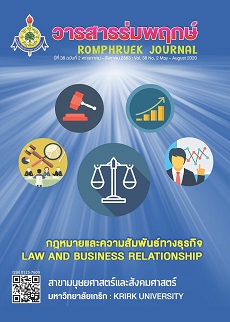Information Communication Strategy of Hypocritical Behavior, Hypocrisy and Consumer trust
Main Article Content
Abstract
This paper studies how two enterprise hypocrisy behavior information communication strategies that are “speaking first then doing” strategy and “ doing first then speaking” strategy to impactconsumer trust and the mediating effect of hypocrisy. By the one-dimensional and multiple-regression analysis, the paper studies the influence of communication strategies of hypocrisy on hypocrisy, the influence of hypocrisy on consumer trust and the communication strategy of hypocrisy on consumer trust, and then studies the mediating effect of hypocrisy. The research results show that the information communication strategy of “speaking first then doing” is more likely to cause consumer hypocrisy than the “doing first then speaking” information communication strategy; consumer hypocrisy has negatively effect on ability trust, Integrity trust and kindness trust; Enterprise information communication strategy has a significant negative effect on consumer's ability to trust, integrity trust and good trust; hypocrisy has a mediating effect between enterprise information communication strategy and ability trust, but not significant; hypocrisy has a significant mediating effect between corporate communication strategies and integrity trust or goodness trust.
Article Details
Every article published in the Romphruek Journal of the Humanities and Social Sciences is the opinion and point of view of the authors. Thery're not the viewpoint of Krirk University or the editored department. Any part or all of the articles for pablication must be clearly cited.
References
Baden J, et al. (2005). Saying one thing and doing another : Examining the impact of Event
order on hypocrisy judgments of others. Personality and Social Psychology Bulletin,
(11),1463-1474.
DenniArli, Anthony Grace, Janet Palmer Cuong Pham. (2017). Investigating the direct and
Indirect effects of corporate hypocrisy and perceived corporate reputation on consumers’ attitudes toward the company. Journal of Retailing and Consumer Services, 37(7),139-145.
Fatma, M., Rahman, Z.,. (2015). Consumer perspective on CSR literature review and future
research agenda. Manag. Res. Rev, 38 (2),195–216.
Fassin Y and Buelens M. (2011). The hypocrisy-sincerity continuum in corporate communication
and decision making : A model of corporate social responsibility and business ethics practices. Management Decision, 49(4), 586-600.
Hanna Kim, Won-Moo Hur, Junsang Yeo. (2015). Corporate Brand Trust as a Mediator in the
Relation ship between Consumer Perception of CSR, Corporate Hypocrisy, and
Corporate Reputation. Sustainability, 7(4), 3683-3694.
J Wang, H Wang. (2014). Corporate Hypocrisy in Corporate Social Responsibility Initiatives :
Structure and Scale Development. Advances in Psychological Science, 08, 71-75.
Longinos Marín, PedroJ, Cuestas, Sergio Román. (2016). Determinants of Consumer Attributions
of Corporate Social Responsibility. Journal of Business Ethics, 138(10), 247–260.
Mayer, R. C. Davis, J. H. (2006). Trustworthiness as a source of Competitive advantage.
Strategic management journal, 15(S1),175-190.
McKnight, Chervany. (2002). What trust means E-commerce customer relationships : An
interdisciplinary conceptual typology. International Journal of Electronic Commerce, 6(2), 35-59.
McAIlister, D. T. (1995). Affect and cognition-based trust as foundations for interpersonal
Cooperation in organizations. Academy of Management Journal, 38(1), 24-59.
Parsa, H. G., Kenneth, R. L., Putrevu, S., Kreeger, J. (2015). Corporate social and environmental
responsibility in services : will consumers pay for it.?. J. Retail. Consum. Serv., 22, 250–260.
Rajeev Batra, Victor J. Strecher, PunamAn and Keller. (2015). Leveraging Consumer
Psychology for Effective Health Communications : The Obesity Challenge : The Obesity Challenge. Routledge : London and New York.
Sankar, Sen Shuili Du, CBBhattacharya. (2016). Corporate social responsibility : a consumer
psychology perspective. Current Opinion in Psychology, 10, 70-75.
Wan, L.C., Poon, P.S., Yu, C. (2016). Consumer reactions to corporate social responsibility
Brands : the role of face concern. J. Consum. Mark., 33(1), 52–60.
Wagner T, et al. (2009). Corporate hypocrisy : Overcoming the threat of inconsistent corporate
social responsbility perceptions. Journal of Marketing, 73(6), 77-91.
陈华. (2016). 企业伪善行为及其动因研究. 经济学研究, 6, 53-57.
Chen Hua. (2016). A study on the hypocritical behavior of enterprises and its motivation.
Economics Study, 6, 53-57.
樊帅,田志龙,林静, 王澜波. (2014). 基于社会责任视角的企业伪善
研究述评与展望. 外国经济与管理 , 221(02), 22-31.
Fan Shuai, Tian Zhilong, Lin Jing, Wang Lanbo. (2014). Review and prospect hypocrisy from the
perspective of social responsibility. Foreign economy and management, 221(02), 22-31.
樊帅,田志龙. (2017). 消费者对企业社会责任伪善感知形成机制研
究. 中南财经政法大学学报, 36(2), 2-12.
Fan Shuai, Tian Zhilong. (2017). A study on the formation mechanism of consumers' hypocritical
perception of CSR. Journal of Zhongnan University of Economics and Law, 36(2), 2-12.
马天娇. (2018). 融媒时代突发公共卫生事件信息传播及风险沟通策
略探讨. 新闻研究导报, 9(21), 85-86.
Ma Tianjiao. (2018). Information dissemination and risk communication strategies for public
Heal the mergencies in the age of media integration. Journal of News Research, 9(21), 85-86.
牟宇鹏, 汪涛, 王波. (2012). 企业慈善战略为何适得其反? 消费者感
知企业伪善研究日. 珞珈管理评论, 2, 6- 67.
Mouyupeng, Wang Tao, Wang Bo. (2012). Why does corporate philanthropy strategy backfire?
Consumer perception business hypocrisy research day. Loka Management Review, 2, 6-67.
汪志刚,田志龙,方牵. (2018). 消费者伪善感知对态度和行为的影响.
企业战略, 450(2), 88-94.
Wang Zhigang, Tian Zhilong, Fang Leng. (2018). The influence of consumer hypocrisy perception
on attitude and behavior. Enterprise Strategy, 450(2), 88-94.
王静一,王海忠. (2014). 企业社会责任活动中感知伪善的结构与量
表开. 心理科学进展, 22(7), 1075-1083.
Wang Jingyi, Wang Haizhong. (2014). The structure and scale of perceived hypocrisy in CSR
activities. Advances in Psychological Science, 22(7), 1075-1083.
吴双. (2019).电子商务与社交媒体中电子口碑对消费者行为影响的
差异性研究. 博士.管里科学与工程专业 北京邮电大学, 北京.
Wu Shuang. (2019). Research on the difference of electronic word-of-mouth on consumer
behavior in e-commerce and social media. Faculty of Management and Industry Beijing University of
Posts and Telecommunications, Beijing.
袁少锋, 刘力钢. (2016). 大数据情境下企业伪善的治理机制 : 消费
者惩罚视角. 兰州学刊, 1, 12-21.
Yuan Shaofeng, Liuligang. (2016). Governance mechanism of enterprise hypocrisy in the
context of big data : perspective of consumer punishment. Lanzhou Journal, 1, 12-21.
赵永萍, 赵玉芳, 张进辅. (2016). 刻板印象信息沟通的默认策略. 心
理探索, 36(1), 48-51.
Zhao Yongping, Zhaoyufang, Zhangjinfu. (2016). Default strategy of stereotype information
communication. Psychological Exploration, 36(1), 48-51.


